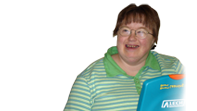Tapesty of Voices: Seeking definitions of access
| MA-Institute for Community Inclusion/Boston Children's Hospital, UCEDD/LEND | |||
| Program Type | UCEDD | Fiscal Year | 2020 |
| Contact | Maria Paiewonsky | ||
| [email protected] | |||
| Phone | 617-287-7697 | ||
| Project Description | |||
|
Title: Defining Accessibility in the Lives of People with Intellectual Disability: A Tapestry of Voices. The United Nations Convention on the Rights of Persons with Disabilities (UNCRPD) (UN 2006) sets out the rights of people with disabilities to live the life of their choosing. Many people choose to live their lives in integrated community settings, with full access to life experiences and this is in tune with the Americans with Disabilities Act of 1990 which promotes access to all areas of public life, including jobs, schools, transportation, and all public and private places that are open to the general public. However, physical location within community does not necessarily means being part of it and inclusion can be an elusive reality for many (Sheerin, Griffiths, de Vries & Keenan, 2015). Thus, physical access is the easy part and has been typically responded to through changes in infrastructure and buildings. Inclusive access is more difficult, requiring social change. For the purposes of guiding this study, therefore, and drawing on the UNCRPD, accessibility is defined as: . the enablement of persons with intellectual disabilities to live the life of their choosing and participate fully in all aspects of life, through provision of access to the physical environment, to transportation, to information, to communications and to the social environment, through inclusion, participation, equal opportunity, respect and acceptance. Furthermore, all aspects of life are delineated by the Convention as including: health; justice, security; privacy; home and family; education; habilitation and rehabilitation; work and employment; social protection; culture; participation in leisure and sports (UN 2006). This proposed study draws from this expanded understanding of accessibility and seeks to achieve a useable definition of accessibility, so to permit identification of its key empirical indicators as they apply to the lives of people with intellectual disability. Irish researcher Dr. Fintan Sheerin and his colleagues at Trinity College Dublin have set out to gather insights from individuals with intellectual and developmental disabilities (IDD) about how they define access to life activities. Sheerin is seeking like-minded researchers in other countries to help gather similar opinions from individuals with IDD in their countries, and has so far identified interested researchers in the United States, Norway and The Netherlands. These researchers, with their own university IRB approval, will use the same methods to gather these opinions- through an arts-based quilt methodology. This study seeks to identify the concepts that people with intellectual and developmental disability in Massachusetts identify to be associated with accessibility and to do this in the light of the UNCRPD-based definition. |
|||







